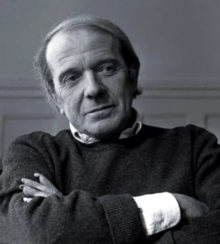Gilles Deleuze | |
|---|---|
 | |
| Born | 18 January 1925 Paris, France |
| Died | 4 November 1995 (aged 70) Paris, France |
| Alma mater | University of Paris (BA, MA, DrE) |
| Era | 20th-century philosophy |
| Region | Western philosophy |
| School | |
| Institutions | University of Paris VIII |
| Notable students | |
Main interests | |
Notable ideas |
|
| Part of a series on |
| Anthropology of nature, science, and technology |
|---|
| Social and cultural anthropology |
Gilles Louis René Deleuze (/dəˈluːz/ də-LOOZ; French: [ʒil dəløz]; 18 January 1925 – 4 November 1995) was a French philosopher who, from the early 1950s until his death in 1995, wrote on philosophy, literature, film, and fine art. His most popular works were the two volumes of Capitalism and Schizophrenia: Anti-Oedipus (1972) and A Thousand Plateaus (1980), both co-written with psychoanalyst Félix Guattari. His metaphysical treatise Difference and Repetition (1968) is considered by many scholars to be his magnum opus.[1][a][b]
An important part of Deleuze's oeuvre is devoted to the reading of other philosophers: the Stoics, Leibniz, Hume, Kant, Nietzsche, Spinoza, and Bergson. A. W. Moore, citing Bernard Williams's criteria for a great thinker, ranks Deleuze among the "greatest philosophers".[4] Although he once characterized himself as a "pure metaphysician",[5] his work has influenced a variety of disciplines across the humanities, including philosophy, art, and literary theory, as well as movements such as post-structuralism and postmodernism.[6]
- ^ a b Smith, Daniel W.; Protevi, John; Voss, Daniela. "Gilles Deleuze". Stanford Encyclopedia of Philosophy. Retrieved 17 February 2011.
- ^ Simon Choat, Marx Through Post-Structuralism: Lyotard, Derrida, Foucault, Deleuze, Continuum, 2010, ch. 5.
- ^ Horner, Robyn (2005). Jean-Luc Marion: a Theo-Logical Introduction. Burlington: Ashgate. p. 3.
- ^ A. W. Moore, The Evolution of Modern Metaphysics: Making Sense of Things, Cambridge University Press, 2012, p. 543: 'intellectual power and depth; a grasp of the sciences; a sense of the political, and of human destructiveness as well as creativity; a broad range and a fertile imagination; an unwillingness to settle for the superficially reassuring; and, in an unusually lucky case, the gifts of a great writer.'
- ^ Beaulieu, Alain; Kazarian, Edward; Sushytska, Julia (eds.): Gilles Deleuze and Metaphysics. (Lanham, MD: Lexington Books, 2014)
- ^ See, for example, Steven Best and Douglas Kellner, Postmodern Theory (Guilford Press, 1991), which devotes a chapter to Deleuze and Guattari.
Cite error: There are <ref group=lower-alpha> tags or {{efn}} templates on this page, but the references will not show without a {{reflist|group=lower-alpha}} template or {{notelist}} template (see the help page).